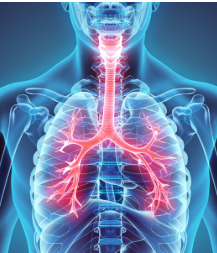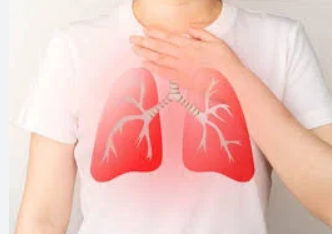Respiratory Diseases are medical conditions that affect the lungs and airways, making it hard for the body to get enough oxygen or remove carbon dioxide properly. They can be acute (short-term) or chronic (long-term), and range from mild to life-threatening.

Types of Respiratory Diseases:
1. Upper Respiratory Tract Infections (URTIs)
- Common cold
- Sinusitis
- Pharyngitis (sore throat)
- Laryngitis
2. Lower Respiratory Tract Infections
- Bronchitis
- Pneumonia
- Tuberculosis (TB)
3. Chronic Respiratory Diseases
- Asthma → airway inflammation and narrowing, causes wheezing and breathlessness.
- Chronic Obstructive Pulmonary Disease (COPD) → includes emphysema and chronic bronchitis, often from smoking.
- Bronchiectasis → abnormal widening of airways leading to mucus buildup and infection.
- Interstitial Lung Disease / Pulmonary Fibrosis → scarring of lung tissue.
4. Respiratory Cancers
- Lung cancer (strongly linked to smoking, pollution, occupational exposures).
5. Other Respiratory Disorders
- Sleep apnea → breathing stops temporarily during sleep.
- Occupational lung diseases (e.g., asbestosis, silicosis).
- Pulmonary hypertension → high blood pressure in lung arteries.

The causes of respiratory diseases:
1. Infectious Causes
- Viruses: common cold, influenza, COVID-19, RSV (respiratory syncytial virus).
- Bacteria: pneumonia (Streptococcus pneumoniae), tuberculosis (Mycobacterium tuberculosis), pertussis.
- Fungi: histoplasmosis, aspergillosis (in immunocompromised patients).
🔹 2. Environmental & Lifestyle Factors
- Smoking → leading cause of COPD, lung cancer, chronic bronchitis, emphysema.
- Air pollution → contributes to asthma, COPD, lung cancer.
- Occupational exposures:
- Asbestos → asbestosis, mesothelioma
- Silica dust → silicosis
- Coal dust → “black lung disease”
- Allergens (pollen, dust mites, animal dander) → asthma.
🔹 3. Genetic & Developmental Factors
- Cystic fibrosis → inherited condition causing thick mucus in lungs.
- Alpha-1 antitrypsin deficiency → can lead to emphysema.
- Some interstitial lung diseases have genetic predisposition.
🔹 4. Immune & Autoimmune Causes
- Asthma → immune overreaction to allergens or irritants.
- Sarcoidosis, pulmonary fibrosis, autoimmune vasculitis → cause chronic inflammation and scarring in the lungs.
🔹 5. Other Medical Conditions
- Gastroesophageal reflux disease (GERD) → can worsen asthma or chronic cough.
- Heart disease (left-sided heart failure can cause pulmonary edema).
- Pulmonary embolism → blood clot in lung vessels.
The symptoms of respiratory diseases:
- Cough
- Dry (asthma, interstitial lung disease)
- Productive with mucus/phlegm (bronchitis, pneumonia, TB, COPD)
- Shortness of breath (Dyspnea)
- During exertion (COPD, asthma, pulmonary fibrosis)
- Even at rest in severe disease
- Wheezing
- Whistling sound during breathing, common in asthma and COPD
- Chest pain or tightness
- Seen in pneumonia, pleurisy, pulmonary embolism, or asthma attacks
- Coughing up blood (Hemoptysis)
- Can occur in TB, lung cancer, bronchiectasis, or severe infections
- Frequent respiratory infections
- Seen in COPD, bronchiectasis, cystic fibrosis
- Fatigue and weakness
- Due to low oxygen levels
- Bluish discoloration of lips or fingers (Cyanosis)
- Sign of low oxygen in the blood
- Noisy or difficult breathing
- Stridor, wheezing, or labored breathing in severe disease
- Sleep disturbances / Snoring
- Common in sleep apnea

